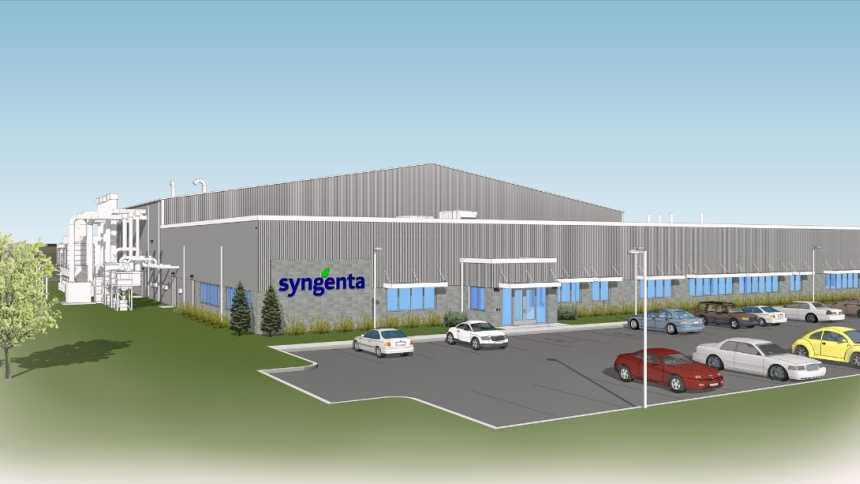Syngenta Breaks Ground On $20 Million Expansion Of North America Seedcare Institute

Architectural rendering of the planned structure at the Syngenta North America Seedcare Institute in Stanton, MN.
The Syngenta North America Seedcare Institute in Stanton, MN, one of the premier seed treatment research facilities in the world, is beginning a $20 million expansion. Today, Syngenta leaders, along with Congressman John Kline of Minnesota’s 2nd District, Matthew Wohlman, assistant commissioner, Minnesota Department of Agriculture, and local officials and industry leaders, broke ground for construction of a 38,000-square-foot building that will be nearly five times the size of the present facility.
The new structure will house high-tech laboratories for R&D, treating, plantability, dust-off and quality assurance, a scale-up treating area, a treating equipment performance area to simulate real-life experiences for customers, state-of-the-art training facility, seed warehouse as well as office and meeting space.
The expanded Seedcare Institute will allow Syngenta to accelerate the development of new seed treatment products and technology and meet the increasing demand by farmers and seed companies to protect high-value seeds and seed traits. In addition, it will augment customer education and stewardship.
“Farmers’ challenges are becoming increasingly complex,” said Ponsi Trivisvavet, president of Syngenta Seeds Inc., and regional director of Syngenta for North America. “We are committed to our customers’ success and that begins with innovation. Syngenta invested more than $1.3 billion in R&D last year. And our commitment continues right here in Stanton today with the expansion of our North America Seedcare Institute.”
Making crops more efficient is one of six bold commitments Syngenta made when announcing its Good Growth Plan in 2013, an ambitious program to help the world’s farmers grow more from less.
Seed treatment is a chemical or biological substance, typically a fungicide or insecticide, applied in small and precise amounts to the outside of the seed prior to planting. It helps protect the seed from insects and diseases that reside in the soil so it gets off to a strong, healthy start. And it aids in the development of a strong root system — the foundation of a healthy, productive plant.
“Our customers require highly specialized products and services from us,” said Ravi Ramachandran, head of the Syngenta’s North America Seedcare Institute. “As a result, the solutions we work on today are much more sophisticated than they were five to 10 years ago. The seed treatment business has evolved, and the products we develop require an increased level of training for our seed company customers, ag retailers, applicators and farmers to fully realize the value of our technologies and best management practices and stewardship.”
For more than 35 years, Syngenta has been a leader in seed treatment technology. This heritage dates back to 1979 with the introduction of Concep seed safener, the first product of its kind for sorghum.
Syngenta now operates 10 Seedcare Institutes globally, and one more is scheduled to open shortly in Singapore. Our global network of Seedcare Institutes serves as centers of excellence in product application, quality management, training, seed science and product support for customers.
“This expansion in Stanton further underscores Syngenta’s investment in innovation and commitment to our Seedcare customers,” said Tim Kroenke, head of Syngenta’s Seedcare business in North America. “This is an exciting time in the seed treatment industry, the Stanton community, and the state of Minnesota.”
In addition to the construction and capabilities investment, about a half-dozen jobs will be added in Stanton initially and potentially more than a dozen. The expansion is expected to be completed by end of 2016.






